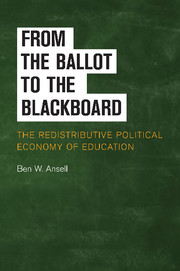Book contents
- Frontmatter
- Contents
- List of Tables
- List of Figures
- Preface
- 1 THE REDISTRIBUTIVE POLITICAL ECONOMY OF EDUCATION
- 2 THE EXPANSION OF EDUCATION TO THE MASSES: THEORY AND DATA
- 3 THE EXPANSION OF EDUCATION: HISTORICAL EVIDENCE
- 4 THE PARTISAN POLITICS OF EDUCATION
- 5 HIGH POLITICS IN HIGHER EDUCATION
- 6 CONCLUSION
- Bibliography
- Index
- Titles in the Series
3 - THE EXPANSION OF EDUCATION: HISTORICAL EVIDENCE
Published online by Cambridge University Press: 06 July 2010
- Frontmatter
- Contents
- List of Tables
- List of Figures
- Preface
- 1 THE REDISTRIBUTIVE POLITICAL ECONOMY OF EDUCATION
- 2 THE EXPANSION OF EDUCATION TO THE MASSES: THEORY AND DATA
- 3 THE EXPANSION OF EDUCATION: HISTORICAL EVIDENCE
- 4 THE PARTISAN POLITICS OF EDUCATION
- 5 HIGH POLITICS IN HIGHER EDUCATION
- 6 CONCLUSION
- Bibliography
- Index
- Titles in the Series
Summary
INTRODUCTION
Statistical analysis in the previous chapter has confirmed a substantively strong and statistically robust relationship between public education spending and our two chief causal candidates: democracy and openness. However, even after running this battery of tests, our candidates remain just that ' correlations alone cannot directly test causation. To get a handle on the validity of the causal mechanisms developed in Chapter 2, we need to examine the historical experience of a variety of states in much greater detail. In this chapter, I provide an analysis of education policy across a broad array of states, both developed and developing, and from South Asia to Western Europe. The cases demonstrate a profound connection among political events, trade policies, and education provision and add both empirical richness and causal clarity to the quantitative analysis in Chapter 2.
The chapter begins by examining changes in both democracy and globalization and their effects on education spending in the Philippines. We see firstly that the tumultuous experience with different political regimes in the Philippines since the sixteenth century has had very powerful effects on education funding, particularly during and following the period of martial law declared under Ferdinand Marcos. The volatility of political representation in the Philippines demonstrates both the positive effect on education that follows independence and democratization and the negative effects on education of colonialism, empire, and autocracy. The Philippines has also experienced significant vacillation in its degree of integration with the international economy.
- Type
- Chapter
- Information
- From the Ballot to the BlackboardThe Redistributive Political Economy of Education, pp. 72 - 118Publisher: Cambridge University PressPrint publication year: 2010



